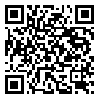Volume 10, Issue 5 (Special Issue on Educational Development 2011)
Iranian Journal of Medical Education 2011, 10(5): 552-565 |
Back to browse issues page
Download citation:
BibTeX | RIS | EndNote | Medlars | ProCite | Reference Manager | RefWorks
Send citation to:



BibTeX | RIS | EndNote | Medlars | ProCite | Reference Manager | RefWorks
Send citation to:
Dehghani Poudeh M, Shams B, Ashourioun V, Esmaeilee A, Asilian A, Nasri P et al . Internal Assessment Of Isfahan General Medicine Curriculum Based On Basic Standards Of Ministry Of Health And Medical Education: A Model For Evaluation And Analysis Of Results. Iranian Journal of Medical Education 2011; 10 (5) :552-565
URL: http://ijme.mui.ac.ir/article-1-1545-en.html
URL: http://ijme.mui.ac.ir/article-1-1545-en.html
Mostafa Dehghani Poudeh 
 , Behzad Shams
, Behzad Shams 
 , Vahid Ashourioun *
, Vahid Ashourioun * 
 , Atosa Esmaeilee
, Atosa Esmaeilee 
 , Ali Asilian
, Ali Asilian 
 , Parveneh Nasri
, Parveneh Nasri 
 , Marzieh Hosseini
, Marzieh Hosseini 


 , Behzad Shams
, Behzad Shams 
 , Vahid Ashourioun *
, Vahid Ashourioun * 
 , Atosa Esmaeilee
, Atosa Esmaeilee 
 , Ali Asilian
, Ali Asilian 
 , Parveneh Nasri
, Parveneh Nasri 
 , Marzieh Hosseini
, Marzieh Hosseini 

, ashourioun@med.mui.ac.ir
Abstract: (22215 Views)
Introduction: Necessity for promotion of education quality in course of medicine forced the educational authorities including those of Isfahan school of Medicine to take actions towards promotion of education using an accreditation evaluation model in this course parallel to worldwide motion. This article emphasizes on a model by which this study was conducted and reported. Methods: This is a descriptive study conducted on seven domains of general medicine curriculum. In the model used in this study, in addition to the current condition, optimal condition was determined. If 70% of the indicators were appropriate in each domain, that domain was considered as appropriate, between 40-70% as semi appropriate and less than 40% was considered as inappropriate. The study was conducted in some steps including forming internal assessment committee, determining factors criteria and indicators, holding educational workshop, preparing data collection tool, data collection and analysis, report preparation and suggestions. Result: In domain of mission 70%, educational planning 80%, faculty members 74%, resources 54%, top and executive management 75%, student 34%, evaluation 61% and finally overall ratio 57% of the indicators were appropriate. Conclusion: Domains of student, resources and evaluation need continuous programming and working. Researchers have some suggestions including taking defined strategies for selecting education managers, using modern educational policies, reinforcing tests assessment system and increasing school authority in having clinical education resources.
Type of Study: other |
Subject:
other
Received: 2011/04/3 | Accepted: 2011/08/4 | Published: 2011/02/15 | ePublished: 2011/02/15
Received: 2011/04/3 | Accepted: 2011/08/4 | Published: 2011/02/15 | ePublished: 2011/02/15
Send email to the article author
| Rights and permissions | |
 |
This work is licensed under a Creative Commons Attribution-NonCommercial 4.0 International License. |


